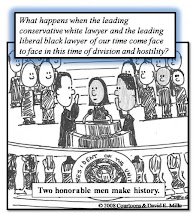
FIRST APPEARANCES MAY LEAD TO A SECOND UNWANTED ONE
BY Norm Kent
In the past year, our county has successfully implemented an expedited first appearance process, which speeds up the bonding and release process for citizens charged with crimes. Still, there was a secondary problem.
For decades, one of the most glaring injustices at first appearance allowed for individuals who were charged with any violations of probation to sit in jail without a bond, for ludicrously long periods of time- until the jurists assigned their original cases got around to hearing a first VOP. Sometimes this would take up to ten days, sometimes longer, but in any case, the defendant remained in jail routinely.
The tragedy was, of course that many of those incarcerated were locked up on stupid charges and technical violations for which a judge might have not only granted a bond, they might have never issued a no-bond warrant. The misery festered in apathy, longer than it should have, because a lazy and self-indulgent defense bar failed to act as a cohesive group and demand meaningful change. Compound that with a lethargic judiciary never inspired to advance the rights of detainees, and a rotten situation lingered unconscionably. We should have done better.
Nothing better reflects how entrenched and toxic the process was then by studying the reaction jurists had to Howard Finkelstein when he first became Public Defender and challenged the insidious system of not giving even first time arrestees a meaningful first hearing. Think about it. If persons with no prior record were not getting a meaningful first hearing from jurists, where do you think probationers who had already pled out fit into that process? Very low on the totem pole, that's where.
For decades, one of the most glaring injustices at first appearance allowed for individuals who were charged with any violations of probation to sit in jail without a bond, for ludicrously long periods of time- until the jurists assigned their original cases got around to hearing a first VOP. Sometimes this would take up to ten days, sometimes longer, but in any case, the defendant remained in jail routinely.
The tragedy was, of course that many of those incarcerated were locked up on stupid charges and technical violations for which a judge might have not only granted a bond, they might have never issued a no-bond warrant. The misery festered in apathy, longer than it should have, because a lazy and self-indulgent defense bar failed to act as a cohesive group and demand meaningful change. Compound that with a lethargic judiciary never inspired to advance the rights of detainees, and a rotten situation lingered unconscionably. We should have done better.
Nothing better reflects how entrenched and toxic the process was then by studying the reaction jurists had to Howard Finkelstein when he first became Public Defender and challenged the insidious system of not giving even first time arrestees a meaningful first hearing. Think about it. If persons with no prior record were not getting a meaningful first hearing from jurists, where do you think probationers who had already pled out fit into that process? Very low on the totem pole, that's where.
By asking for meaningful bond hearings, the establishment tried to make Howard out to be a zombie trying to overthrow the judicial system. All he was asking for was that elected judges do their jobs justly so that citizen defendants could have their rights heard and protected. The establishment hated him for doing the right thing, but what is right is not always popular, and what is popular is not always right.
When defense attorneys came to court on VOP hearings, all too often we would review allegations that were insufficient so as to warrant a violation of probation to begin with. It did not matter. With probation, you always had one foot in the jail. And if some vengeful probation officer devised a scurrilous way to lock up one of their charges, they would have no problem employing a devious technique to insure the person they wanted locked up got locked up. Just like a cop with a pen and a pc sheet, it's a one way street. The judge does not read a report with the defendant's side of the arrest. Needless to say, the policing process for probation officers was always lacking to begin with, but that is another article altogether.
Of course, it would be disingenuous not to acknowledge many probationers did in fact grievously violate their probation by engaging in unlawful conduct which warranted immediate incarceration. That goes without saying. The system of instant incarceration without a bond provided a mechanism for those transgressions. Probation got their way.
What the system did not do was engage a speedy process which insured that persons who may have been unjustly arrested get a meaningful hearing sooner rather than later. That changed with Jay Hurley and the First Appearance magistrate process. Instead of a race to get out of a docket no judge wanted in the first place, a single jurist was given the discriminating task of scrutinizing the flawed process of detention. And it’s working successfully. But today I address a new flaw I have found in our already flawed system.
When defense attorneys came to court on VOP hearings, all too often we would review allegations that were insufficient so as to warrant a violation of probation to begin with. It did not matter. With probation, you always had one foot in the jail. And if some vengeful probation officer devised a scurrilous way to lock up one of their charges, they would have no problem employing a devious technique to insure the person they wanted locked up got locked up. Just like a cop with a pen and a pc sheet, it's a one way street. The judge does not read a report with the defendant's side of the arrest. Needless to say, the policing process for probation officers was always lacking to begin with, but that is another article altogether.
Of course, it would be disingenuous not to acknowledge many probationers did in fact grievously violate their probation by engaging in unlawful conduct which warranted immediate incarceration. That goes without saying. The system of instant incarceration without a bond provided a mechanism for those transgressions. Probation got their way.
What the system did not do was engage a speedy process which insured that persons who may have been unjustly arrested get a meaningful hearing sooner rather than later. That changed with Jay Hurley and the First Appearance magistrate process. Instead of a race to get out of a docket no judge wanted in the first place, a single jurist was given the discriminating task of scrutinizing the flawed process of detention. And it’s working successfully. But today I address a new flaw I have found in our already flawed system.
It needs IMMEDIATE attention.
Fast forward to Section 948.06, of Florida Statutes. This is a law which provides that an arresting officer may put a no bond-hold on any person who is arrested that is on probation. It is imposed even before the judge supervising the probationer knows of the arrest and has issued a warrant. Let’s see how this is playing out in magistrate court.
An individual on probation for say, possession of cocaine, has completed one of two years successfully. He owns a home. He works a job. He has a family. He has been doing the things he was supposed to be doing to comply with his rehabilitation. He is asking for no favors, but has a minor run in with the law.
Suppose that job he has is in a convenience store and he is a clerk. And underage kids are trying to constantly score beer or cigarettes. He unwittingly sells a six pack to a minor in the presence of a cop. The officer charges him with the second degree misdemeanor, which provides for a $25 dollar bond or a notice to appear. But say the cop does not like the clerk, because he has an underage teenager, and he wants to teach the clerk a lesson. So the cop does not issue an NTA, he promptly arrests the guy on the second degree misdemeanor, and simultaneously books him into the jail on a No Bond hold under Section 948.06. Police discretion at its worst.
Fortunately, the next morning the probationer comes before Judge Hurley, whose disposition, temperament and discretion in applying bonds has been commendable and extraordinary. Judge Hurley has seemingly been the perfect person for the job. He has been instrumental in reducing jail overcrowding, expediting the preliminary hearing process, and seeing through specious probable cause affidavits. All the things we were not doing for years we are now doing properly. With one judge.
Quietly overhauling an antiquated process which routinely denied defendants’ fundamental rights to counsel or fair bond hearings at first appearance has had consequences. By daring to set bonds where other jurists had imposed no bond holds already, Judge Hurley stepped on toes. The DCA has already intervened to rule that if a jurist has ordered a no bond hold, absent an exemption from that judge, it stands, and Judge Hurley can’t change that. All he can do is tell the defendant we will get you before that judge ASAP, and your case won’t linger needlessly. Plus, when you have a VOP, the magistrate clerk will contact a JA to advise you of the date of your first hearing, scheduling it as soon as possible.
But in those cases where defendants are booked on 948.06 holds, the jurist who may be supervising the probation has not yet signed a warrant. Thus, in those instances, many jurists are allowing Judge Hurley the judicial discretion to do the right thing and order a bond where appropriate.
So now let’s go back to our clerk who sold a six pack of beer to a minor. He gets locked up Tuesday nite by this angry cop, but comes to magistrate court on Wednesday morning. Judge Hurley reviews the PC, decides he is a responsible businessman arrested on a minor charge which presents no threat to the community. He releases the defendant on his own recognizance. But wait, the judge who had placed him on probation has not heard the case yet.
So also on Wednesday, the probation officer finds out her charge has been arrested. She could care less that Judge Hurley released him on the 948.06 violation. She may not even know it. Based on the arrest, she immediately prepares a warrant and presents it to the judge who supervises the guy’s probation. That same afternoon, the judge signs the warrant.
The probationer is released from custody on Wednesday afternoon due to Judge Hurley’s ROR. He goes home and sleeps off his nite in jail. He wakes up Thursday morning at 5 a.m. with a BSO deputy and a probation officer at his front door to take him into custody on the VOP signed the day before by the judge who placed him on probation to begin with.
Legally, absolutely nothing had changed. The first jurist heard the facts of the 948.06 hold, and ordered the defendants released ROR. Now the judge supervising his probation has effectively revoked his bond without a hearing.
Sure, you can’t do that you say. So you rush to call the judge’s JA and point out the inequity, and she says the “Court is booked for the day. I will give you a bond hearing next week.” Or she tells you instead “The judge only sets bond hearings after he reads your written motion. Submit it. We will call you; don't call us." But your client was remanded without cause or justification, you say, and we did not come all this way and initiate a brand new magistrate process so defense lawyers have to be hurrying to the 4th DCA because of a fatal flaw in the system.
Can this happen? It is happening routinely and repeatedly every day already, but because the defense bar is still a disorganized lot and Russell is too busy looking for new suits at Macy's, there has not yet been an orchestrated and forceful protest. Practically, Chief Judge Tobin could correct this monstrous flaw summarily by entering a Circuit-wide Order mandating that once the first jurist at magistrate has set a bond under the law, the supervising judge on probation may not revoke it absent a notice, a hearing, and a change in the circumstances of the case. Something we called due process. I think they still allow it in this county, at least in some courtrooms.
Fast forward to Section 948.06, of Florida Statutes. This is a law which provides that an arresting officer may put a no bond-hold on any person who is arrested that is on probation. It is imposed even before the judge supervising the probationer knows of the arrest and has issued a warrant. Let’s see how this is playing out in magistrate court.
An individual on probation for say, possession of cocaine, has completed one of two years successfully. He owns a home. He works a job. He has a family. He has been doing the things he was supposed to be doing to comply with his rehabilitation. He is asking for no favors, but has a minor run in with the law.
Suppose that job he has is in a convenience store and he is a clerk. And underage kids are trying to constantly score beer or cigarettes. He unwittingly sells a six pack to a minor in the presence of a cop. The officer charges him with the second degree misdemeanor, which provides for a $25 dollar bond or a notice to appear. But say the cop does not like the clerk, because he has an underage teenager, and he wants to teach the clerk a lesson. So the cop does not issue an NTA, he promptly arrests the guy on the second degree misdemeanor, and simultaneously books him into the jail on a No Bond hold under Section 948.06. Police discretion at its worst.
Fortunately, the next morning the probationer comes before Judge Hurley, whose disposition, temperament and discretion in applying bonds has been commendable and extraordinary. Judge Hurley has seemingly been the perfect person for the job. He has been instrumental in reducing jail overcrowding, expediting the preliminary hearing process, and seeing through specious probable cause affidavits. All the things we were not doing for years we are now doing properly. With one judge.
Quietly overhauling an antiquated process which routinely denied defendants’ fundamental rights to counsel or fair bond hearings at first appearance has had consequences. By daring to set bonds where other jurists had imposed no bond holds already, Judge Hurley stepped on toes. The DCA has already intervened to rule that if a jurist has ordered a no bond hold, absent an exemption from that judge, it stands, and Judge Hurley can’t change that. All he can do is tell the defendant we will get you before that judge ASAP, and your case won’t linger needlessly. Plus, when you have a VOP, the magistrate clerk will contact a JA to advise you of the date of your first hearing, scheduling it as soon as possible.
But in those cases where defendants are booked on 948.06 holds, the jurist who may be supervising the probation has not yet signed a warrant. Thus, in those instances, many jurists are allowing Judge Hurley the judicial discretion to do the right thing and order a bond where appropriate.
So now let’s go back to our clerk who sold a six pack of beer to a minor. He gets locked up Tuesday nite by this angry cop, but comes to magistrate court on Wednesday morning. Judge Hurley reviews the PC, decides he is a responsible businessman arrested on a minor charge which presents no threat to the community. He releases the defendant on his own recognizance. But wait, the judge who had placed him on probation has not heard the case yet.
So also on Wednesday, the probation officer finds out her charge has been arrested. She could care less that Judge Hurley released him on the 948.06 violation. She may not even know it. Based on the arrest, she immediately prepares a warrant and presents it to the judge who supervises the guy’s probation. That same afternoon, the judge signs the warrant.
The probationer is released from custody on Wednesday afternoon due to Judge Hurley’s ROR. He goes home and sleeps off his nite in jail. He wakes up Thursday morning at 5 a.m. with a BSO deputy and a probation officer at his front door to take him into custody on the VOP signed the day before by the judge who placed him on probation to begin with.
Legally, absolutely nothing had changed. The first jurist heard the facts of the 948.06 hold, and ordered the defendants released ROR. Now the judge supervising his probation has effectively revoked his bond without a hearing.
Sure, you can’t do that you say. So you rush to call the judge’s JA and point out the inequity, and she says the “Court is booked for the day. I will give you a bond hearing next week.” Or she tells you instead “The judge only sets bond hearings after he reads your written motion. Submit it. We will call you; don't call us." But your client was remanded without cause or justification, you say, and we did not come all this way and initiate a brand new magistrate process so defense lawyers have to be hurrying to the 4th DCA because of a fatal flaw in the system.
Can this happen? It is happening routinely and repeatedly every day already, but because the defense bar is still a disorganized lot and Russell is too busy looking for new suits at Macy's, there has not yet been an orchestrated and forceful protest. Practically, Chief Judge Tobin could correct this monstrous flaw summarily by entering a Circuit-wide Order mandating that once the first jurist at magistrate has set a bond under the law, the supervising judge on probation may not revoke it absent a notice, a hearing, and a change in the circumstances of the case. Something we called due process. I think they still allow it in this county, at least in some courtrooms.
In another situation, a young man Judge Hurley wanted to release on a charge of not carrying a license could not get out and spent a week in jail because his supervising judge was on vacation and had told Judge Hurley he could not set bonds on his probation cases.
In another case, a young man held on a trespassing charge early in the week also had a no bond hold under 948.06. He bonded out, only to be remanded later in the week by the jurist supervising his probation. No facts had changed. The judge had. And that judge insisted on a hearing with the arresting officer present. Why is it almost double jeopardy? Because the kid is effectively being arrested twice on the same charge, first by the 948 hold, and then second by the judge’s new VOP warrant. We can’t have this insanity continue.
This is an emergency, and has to be acted on at once, and without delay. So much so I am willing to let this article even be posted on Jaablog, because these kinds of flaws in the system is what Jaablog has been best at exposing.
Students of bond law and practicing attorneys will say, 'whoa, wait': “Unless there is a change in the circumstances of the first bond, no second jurist can override it. Bond is a matter of entitlement and right.” Kevin Kulick has a DCA case on point. That would be true in most instances, if this was not a probation violation case, where the supervising jurist can violate probation if it ‘satisfies the conscience of the court.'; where the State takes the position that the 948 release by Judge Hurley is not binding upon the judge supervising probation. I talked with two ASA’s about this in the Appeals Division and both are intrigued that is a case of first impression. For the defendants, it's a case of second jailing.
This is an emergency, and has to be acted on at once, and without delay. So much so I am willing to let this article even be posted on Jaablog, because these kinds of flaws in the system is what Jaablog has been best at exposing.
Students of bond law and practicing attorneys will say, 'whoa, wait': “Unless there is a change in the circumstances of the first bond, no second jurist can override it. Bond is a matter of entitlement and right.” Kevin Kulick has a DCA case on point. That would be true in most instances, if this was not a probation violation case, where the supervising jurist can violate probation if it ‘satisfies the conscience of the court.'; where the State takes the position that the 948 release by Judge Hurley is not binding upon the judge supervising probation. I talked with two ASA’s about this in the Appeals Division and both are intrigued that is a case of first impression. For the defendants, it's a case of second jailing.
But even defense attornys such as Herb Cohen point out and concur that the judge supervising probation has an absolute right to overrule the magistrate's first bond. After all, when I went before the magistrate, there was no warrant and he set a fair bond. Now the supervising court steps in and has signed a warrant. The circumstances have changed. A new bond can be set. So the defendant is remanded legitimately by law, but its impractical in its application. He goes to jail twice in the same week for the same thing.
The main point here is that if the judge supervising probation can take the position that he can and will override whatever the first appearance jurist did, it effectively neuters the first appearance judge. It means your client can go back to jail for the very same thing another judge had just released him for. And if the judge supervising probation finds himself in disagreement with Judge Hurley, he can also issue a blanket order to Judge Hurley saying you have absolutely no right to set any bond on any of my probationers. A group of circuit court judges already have, and that effectively neuters the first appearance system. Of course, Judge Hurley won't be there forever. So we are not neutering him. But we are setting up a system that instead of being innovative will be sterile in its infancy.
The main point here is that if the judge supervising probation can take the position that he can and will override whatever the first appearance jurist did, it effectively neuters the first appearance judge. It means your client can go back to jail for the very same thing another judge had just released him for. And if the judge supervising probation finds himself in disagreement with Judge Hurley, he can also issue a blanket order to Judge Hurley saying you have absolutely no right to set any bond on any of my probationers. A group of circuit court judges already have, and that effectively neuters the first appearance system. Of course, Judge Hurley won't be there forever. So we are not neutering him. But we are setting up a system that instead of being innovative will be sterile in its infancy.
If judges wish to retain the absolute power to be the only ones to set their probationers' bonds, then so be it. Let us grudgingly at least provide an immediate and expedited hearing in that court. But let's not arrest a guy twice in the same week for the same charge. It does not compute.
So what do we do? We have a crisis here. We are letting people out of jail on Monday to arrest them on Tuesday. We have a set up a system which provides for Sanity on Wednesday and Insanity on Thursday. We have insured that the DCA will have to get involved somehow someway and render a decision because somewhere an attorney is not going to be able to work this out reasonably with a court.
In one case, last week, I tried to argue that the supervising judge had no authority to remand my client; that he took him into custody illegally, by revoking the bond of a previous jurist without a hearing. "Set a hearing, notice the state, we will argue it," said the court. While my client sits in custody.
So what do we do? We have a crisis here. We are letting people out of jail on Monday to arrest them on Tuesday. We have a set up a system which provides for Sanity on Wednesday and Insanity on Thursday. We have insured that the DCA will have to get involved somehow someway and render a decision because somewhere an attorney is not going to be able to work this out reasonably with a court.
In one case, last week, I tried to argue that the supervising judge had no authority to remand my client; that he took him into custody illegally, by revoking the bond of a previous jurist without a hearing. "Set a hearing, notice the state, we will argue it," said the court. While my client sits in custody.
Reducing this entire column to one sentence, the constitutional issue procedurally is whether the jurist’s remand of the probationer did not illegally supercede and violate the bond set by the first appearance magistrate. That issue MUST be resolved at once.
If the Chief Judge does not work out a vehicle to deal with this issue at once, the 4th will have to decide it soon, but only after, I dare say, hundreds of probationers went to jail twice on the same charge. That is not an innovation. That is insanity. Of course, we have been comfortable with that for years. But the idea was to eliminate it this time around.
Why do I say this is an emergency?
Why do I say it requires immediate review?
Why do I say this has to be resolved at once?
Because freedom is precious; because going home at nite to sleep on your own bed, in your own home, with your loved ones, that matters. And it is a right we should not take away lightly, for any reason, any time without just cause or due process.
Hopefully, things like that still matter to you.
































i will say this norm, when you go after someone you don't fool around, sounds like you found some of that old fire in your belly, you described something, well we had an old army saying for it- SNAFU- most people do not know what it means, Situation Normal- All Fucked Up ! that is the system you described.
ReplyDeleteNORM !!! You r alive ! Word is you had a brain scan, and they found nothing :-) You make two terrible misteaks (sic) in this column:
ReplyDelete1) How dare you presume Russell Williams buys suits at Macy's? and
2) You are under the naive presumption that someone in this county will actually care about what you say and do something about it.
Off to the 4th with you.
The only way change will come about.
LTL, no not Long Time Lover,
Long Time Lawyer.
Norm,
ReplyDeleteJust out of curiosity;
would your opinion change if the defendant, instead of being on probation for possession,
were on probation for a more serious offense, which itself had been "broken down" from an even more serious violent crime charge because of a faulty Miranda warning, and the sentencing judge had warned the defendant that if he was caught "spitting on the sidewalk" he would be looking at a very long sentence(none of which would be known by the magistrate)?
Glad to see you are back to good health.
This is really happening?
ReplyDeleteWhat a mess !!!
I have got an answer for the Chief of Judges.
There have got to be some judges who do not want to see everyone they are supervising get arrested anytime they slip up on a nominal offense, and they can't be expected to see the arrestee immediately, the same day, instantly, so THE ONLY SANE and logical system is to allow the magistrate in his discretion to set a bond,
AND THEN,
send the file immediately to the supervising judge, who, if he or she does not approve, promptly sets up a hearing on a Bond Status, with notice to the defendant and the state to have witnesses available and ready, even if it is going to be at the first VOP.
Then the defendant's rights are protected, he is not needlessly re=arrested, and the judge's judicial supervisory authority on probation is also safeguarded.
Next problem, please.
Start with changes to sections 8 and 9 of AO 2009-58-CRIM. It needs to address non-warrant VOP arrests, and shorten time periods for appearance before the supervising judge if that judge won't allow Hurley to set bond or if no bond is set.
ReplyDelete